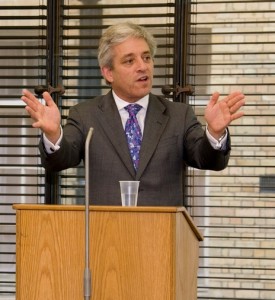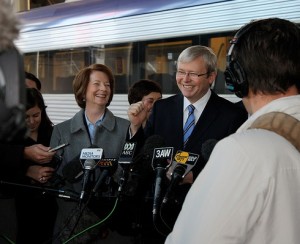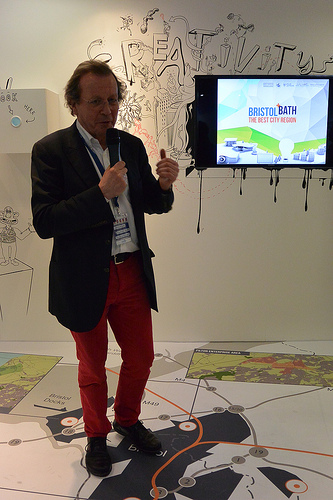100 things we learned about democracy in 2013: Part two
To mark the end of 2013, Democratic Audit has collected 100 of the most important, surprising and downright disturbing things we have learned about democracy this year. Here is part two of our list, ranging from Australian coups and the expanding Lords to neighbourhood planning and the political impact of a pair of red trousers.
26. At least one Police and Crime Commissioner wants to abolish his own job, although most others disagree. Find out more here.
27. If Britain doesn’t give voting rights to prisoners, we may be forced to leave the European Convention on Human Rights, according to the Attorney General. Find out more here.
28. Elections are a decision-making domain in which adolescents’ cognitive-processing abilities would almost certainly remain uncompromised. Find out more here.
29. Ruling regimes in the Gulf use investments in English football to improve their public image. Find out more here.
30. Only a small minority of constituency level campaigns at the 2010 general elections used Twitter and Facebook to interact with voters. Find out more here.
31. Party conferences have very little influence on party policy, but they are good for democracy nonetheless. Find out more here.
32. The public can now, finally, watch recordings of Tower Hamlets council meetings online. But they still can’t record meetings themselves. Find out more here and here.
33. In elections, incumbent candidates spend less time talking about the issues than challengers do. Find out more here.

John Bercow was not opposed by any major parties at the 2010 general election.
34. 45% of all MPs worked in London immediately prior to being elected to Parliament. Find out more here.
35. 63% of the UK public believes politicians can make a difference to major social and economic issues facing the country. Find out more here.
36. Female councillors are less likely to stand for Parliament than their male colleagues. Find out more here.
37. The convention that opposition parties do not oppose the Speaker of the House of Commons in a general election is a relatively recent phenomenon. Find out more here.
38. The demise of the Free Democrats in Germany does not necessarily foreshadow a similar fate for the Liberal Democrats. Find out more here.
39. The House of Lords is the largest parliamentary chamber of any democracy, and is likely to grow to over 1,000 peers after the next election. Find out more here and here.
40. Governing parties of the centre left were more likely to lose support during the recent economic crisis than those of the centre right. Find out more here.

Kevin Rudd and Julia Gillard have overthrown each other for the last time as Australian Labor leaders.
41. Kevin Rudd’s replacement of Julia Gillard might be the last coup in the Australian Labor Party, following party reforms that make it much harder to overthrow a leader. Find out more here.
42. According to a former Downing Street adviser, there is a complete lack of correlation between ministerial competence and media perceptions of their performance. Find out more here.
43. The NHS is exploring new ways to encourage patient and public involvement in decision-making, including the establishment of a Citizens Assembly. Find out more here.
44. Gordon Brown’s Cabinet appointments were the youngest and least experienced of any post-war Prime Minister. Find out more here.
45. The Parliamentary and Health Service Ombudsman handled 27,000 enquiries from the public last year, an increase of 13%. Find out more here.
46. Voters are more likely to support parliamentary candidates that live closer to their constituency. Find out more here.

George Ferguson, elected mayor of Bristol, has been in post for just over a year.
47. Ethnic minority MPs are no more likely to table Early Day Motions on issues relating to ethnic minorities in Parliament, but they are more likely to ask questions on these issues. Find out more here and here.
48. Turnout in the newly-introduced neighbourhood planning referendums has been as high as 50%. Find out more here.
49. According to the Association of Professional Political Consultants, 99% of lobbyists that regularly meet government ministers would not be required to register under the proposed Transparency of Lobbying, Non-party Campaigning and Trade Union Administration Bill. Find out more here.
50. Habitually wearing red trousers does not prevent a politician having a significant impact on the governance of his city. Find out more here.
—
We will be publishing the next instalment of 100 things we learned about democracy in 2013 on Democratic Audit tomorrow. View the full series so far here.
Note: This post represents the views of the authors and does not give the position of Democratic Audit or the LSE. Please read our comments policy before commenting. Shortlink for this post: buff.ly/1jMLDJm
—
Images:
Sheikh Mansour – Das österreichische Außenministerium, CC BY 2.0
John Bercow – Commonwealth Parliamentary Association UK Branch, CC BY-NC 2.0
Kevin Rudd & Julia Gillard – Drew Douglas, CC BY-NC 2.0
George Ferguson – EG Focus, CC BY 2.0






 Democratic Audit's core funding is provided by the Joseph Rowntree Charitable Trust. Additional funding is provided by the London School of Economics.
Democratic Audit's core funding is provided by the Joseph Rowntree Charitable Trust. Additional funding is provided by the London School of Economics.
45% of all MPs worked in London immediately prior to being elected to Parliament https://t.co/P6QYIR6xtj <the UK is unbalanced>
RT @democraticaudit: Red trousers, female councillors and football. The next 25 in our series on what we learned about democracy this year …
pleasantly surprised to see my work listed #38 in @democraticaudit’s 100 things we learnt about democracy in 2013 https://t.co/HnZV4X0VwL
100 insights into UK democracy in 2013 by @democraticaudit Part 1 https://t.co/Py68MZGb3G and Part 2 via @PJDunleavy https://t.co/Vl0HZOYpRH
https://t.co/7pBfpKj3kJ another #funfact for you… 45% of all MPs worked in London immediately prior to being elected to Parliament.
100 things we learned about democracy in 2013, #39, via @electoralreform: House of Lords could have over 1,000 peers https://t.co/JZAsCjvbvU
second part of “100 things we learned about democracy in 2013” from Democratic Audit https://t.co/pnS45Ogtr7
Rt @costajoaoda: “@democraticaudit: 100 things we learned about democracy in 2013: Part two https://t.co/1cQgG2ySmn“”
RT @costajoaoda: “@democraticaudit: 100 things we learned about democracy in 2013: Part two https://t.co/30hNBxLqO4“
100 things we learned about democracy this year, #50: @GeorgeFergusonx’s red trousers and the governance of Bristol https://t.co/JZAsCjvbvU
Thanks @democraticaudit Great range of 2013 stories. Nice to be #50 in your roundup: https://t.co/KoMRDu9KOX Keep up the good work in 2014!